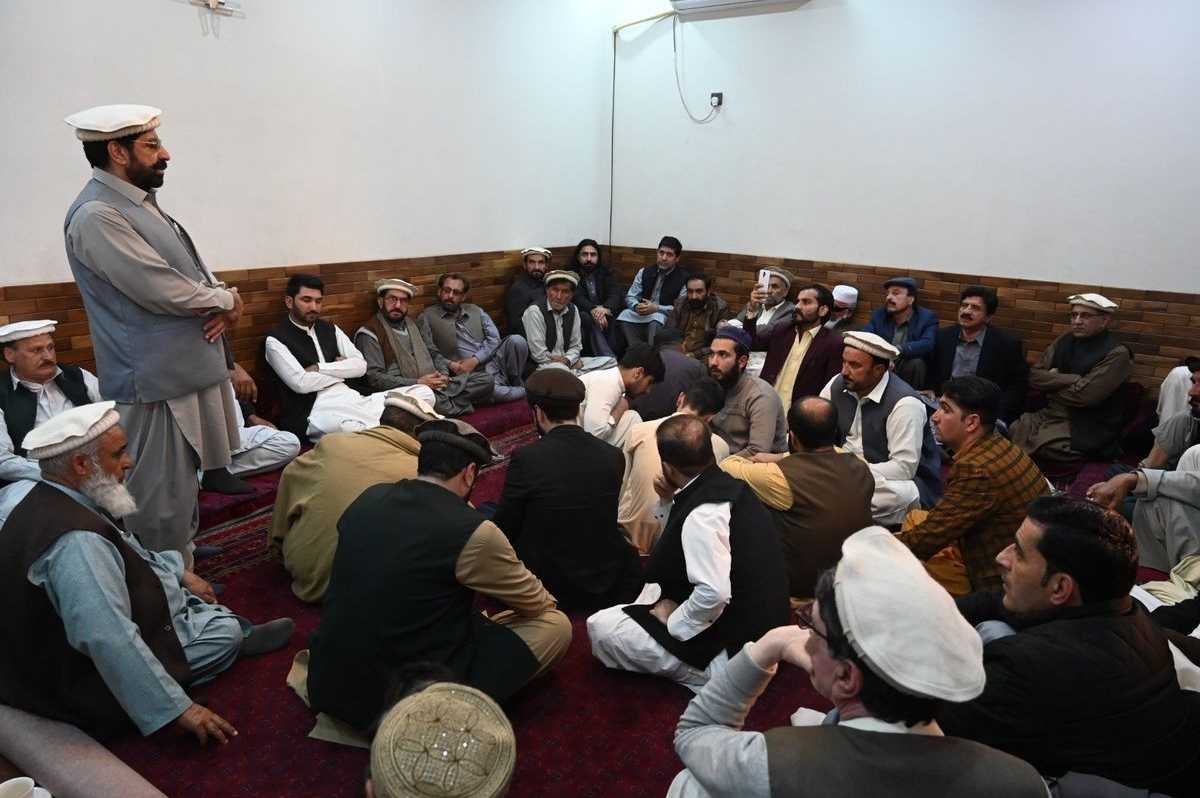Pakistan forms committee to explore revival of jirgas in Khyber Pakhtunkhwa
The committee is expected to submit its final report to the prime minister within 45 days

Kamran Ali
Correspondent Nukta
Kamran Ali, a seasoned journalist from Khyber Pakhtunkhwa, Pakistan, has a decade of experience covering terrorism, human rights, politics, economy, climate change, culture, and sports. With an MS in Media Studies, he has worked across print, radio, TV, and digital media, producing investigative reports and co-hosting shows that highlight critical issues.

The second face-to-face jirga, held in Peshawar, aimed at enforcing a 14-point peace agreement signed on Jan. 1.
Nukta
Prime Minister of Pakistan Shehbaz Sharif has constituted a high-level committee to evaluate proposals for reviving the traditional jirga system in Khyber Pakhtunkhwa (KP) province and enhancing the effectiveness of civil administration in the region.
The initiative aims to establish a credible and legally viable framework for alternative dispute resolution (ADR) that aligns with the country’s constitutional and legal provisions while improving grassroots access to justice.
According to an official notification, the 18-member committee will be headed by Federal Minister for Kashmir Affairs, Gilgit-Baltistan, and Frontier Regions, Engineer Amir Muqam. Federal Law Minister Azam Nazeer Tarar will serve as the co-convener. The body comprises federal ministers, provincial government representatives, a senior police officer, former officials, and secretaries of relevant departments.
What are jirgas?
Jirgas, traditionally found in Pashtun and tribal societies, are informal assemblies of elders that resolve disputes through consensus. Rooted in centuries-old customs, the system serves as a community-based mechanism for justice, particularly in rural and tribal regions.
Although lacking formal legal status in modern Pakistan, jirgas have long been used to settle conflicts over land, family, and blood feuds, often providing faster resolutions than formal courts.
Terms of reference for the committee
The committee has been tasked with consulting stakeholders to assess the feasibility of integrating jirgas into the formal judicial system. This includes clearly defining the jurisdiction and limitations of such bodies and proposing legal amendments to grant recognition to jirga-mediated settlements.
According to the official notification issued by the government, the committee will also outline the role of civil administration in ensuring transparency, impartiality, and proper documentation of proceedings, while incorporating safeguards against coercion. Moreover, it will recommend mechanisms to ensure diverse and equitable representation within the jirga system.
The committee is expected to submit its final report to the prime minister within 45 days.
History of the jirga system
The term jirga originates from the Pashto language, meaning a gathering or circle of people. According to Dr Sajjad Ali, a researcher on traditional justice systems, it has historically functioned as a conflict-resolution forum among tribal societies.
Dr Ali told Nukta that the practice dates back to the Aryan tribes of Afghanistan and India, where even kings would participate in such councils. “From Sultan Bahlol Lodhi to Sher Shah Suri, rulers across the subcontinent relied on jirgas to address public grievances,” he said.
Notable historical examples include the Loya Jirga (Grand Jirga) of 1747 in Qandahar, which endorsed Ahmad Shah Abdali’s leadership, and the 1916 assembly that opposed Amir Habibullah’s stance on the Turkish Caliphate.
Why it matters
Dr Ali believes the jirga plays both judicial and administrative roles in tribal communities by resolving land, property and family disputes through customary practices and collective consensus. “The process, rooted in Pashtunwali (Pashtun code of conduct), offers a swift and inclusive alternative to formal courts, with decisions enforced by community elders,” he explained.
A study by scholars from the University of Sindh’s Department of Criminology supports this view, highlighting the effectiveness of community-based ADR mechanisms. With settlement rates exceeding 70%, the study emphasizes the growing preference for informal, cooperative approaches to dispute resolution in areas underserved by the formal justice system.
Constitutional concerns
Despite its historical significance, legal experts question the constitutionality of reviving the jirga system. Shabir Hussain Gigyani, Advocate Supreme Court, cited a 2019 Supreme Court verdict that declared jirgas and panchayats unconstitutional, saying that such bodies operate outside the formal legal framework and violate several constitutional provisions.
“The Constitution empowers only the courts to resolve disputes—how can a parallel system be justified, and what would be the role of the courts then?” Gigyani asked.
Speaking to Nukta, tribal elder and writer Maulana Khanzeb echoed these concerns. He warned that placing jirgas under administrative control, as was done under the now-defunct Frontier Crimes Regulations (FCR) in the former Federally Administered Tribal Areas (FATA), led to corruption and undermined the credibility of the traditional system.
“While jirgas have historically resolved disputes, any revival must come under judicial oversight to be effective,” he stressed.
Khanzeb also questioned why the proposed revival is limited to KP. “If jirgas are being positioned as a legitimate solution, why not implement the model nationwide?” he asked. He further criticized the federal government’s formation of the committee without seeking input from elected tribal representatives, legal experts, scholars, and community elders.
Gender exclusion
Rukhshanda Naz, former provincial ombudsperson and women’s rights activist, told Nukta that jirgas operate as parallel courts that systematically exclude women -- even in matters that directly affect them.
“There is no precedent of women’s participation in jirgas,” she said, urging the government to focus on strengthening the formal judicial system rather than reviving outdated mechanisms that lack inclusivity.
KP’s Alternate Dispute Resolution Act
In 2020, the KP government passed the ADR Act, enabling courts to refer cases for out-of-court settlements if both parties consent and the matter does not involve complex legal or factual issues. Under this law, ADR proceedings are conducted under the supervision of the relevant court.
Gigyani welcomed this framework, pointing out that it differs fundamentally from traditional jirgas. “The KP ADR system is already in place, and it works. It’s based on mutual consent, excludes complex cases, and operates under judicial oversight. The federal government should consider strengthening and expanding this model instead,” he said.







Comments
See what people are discussing